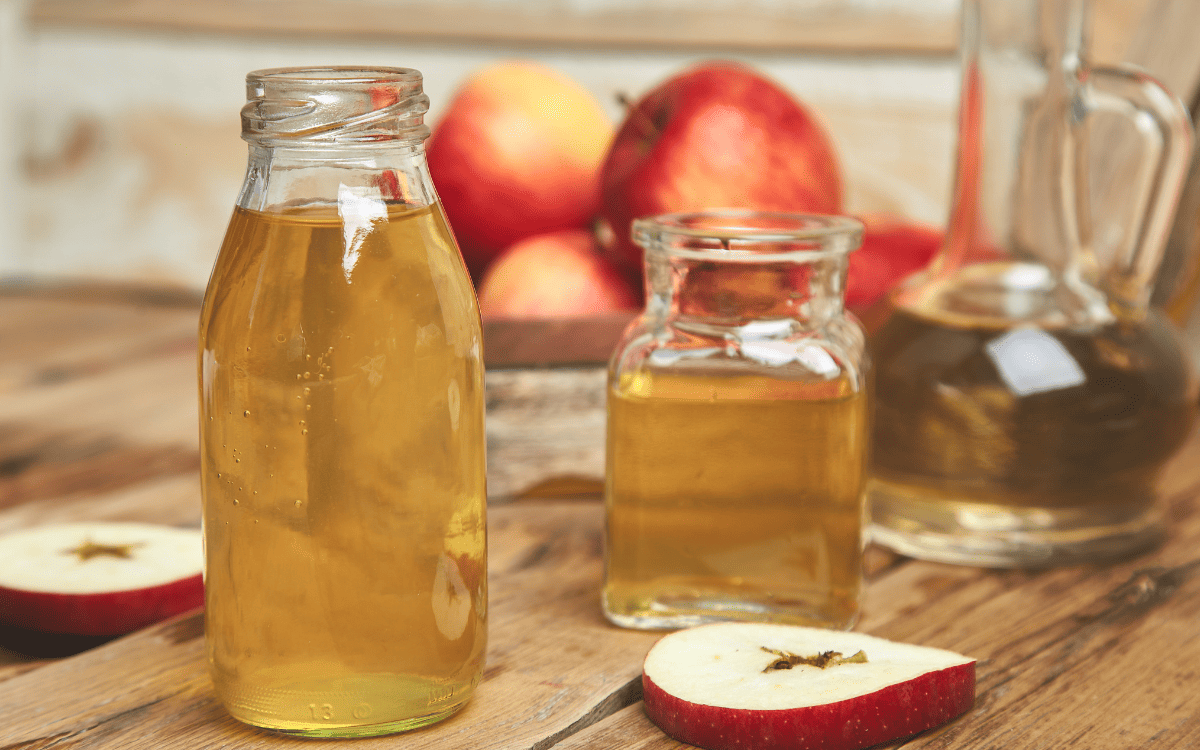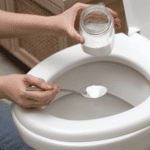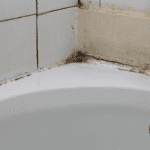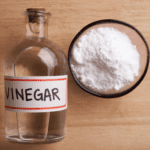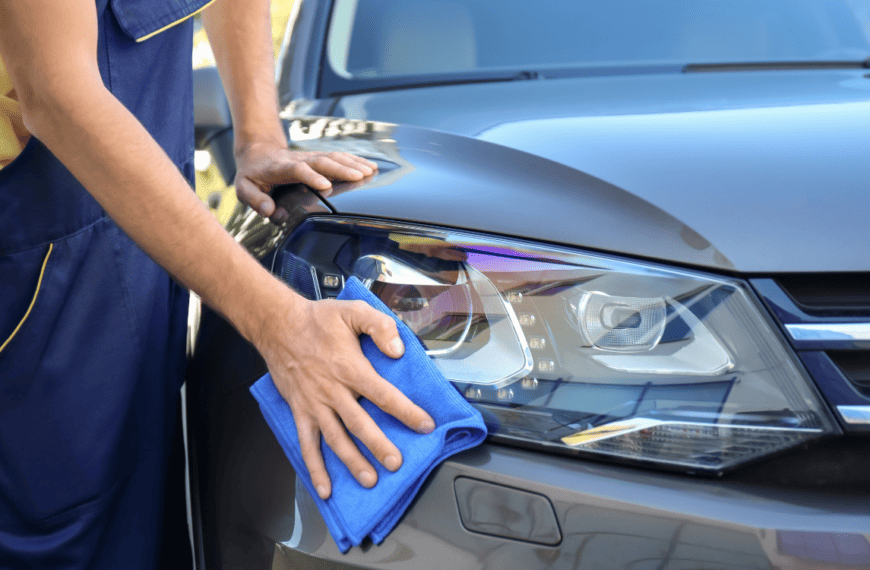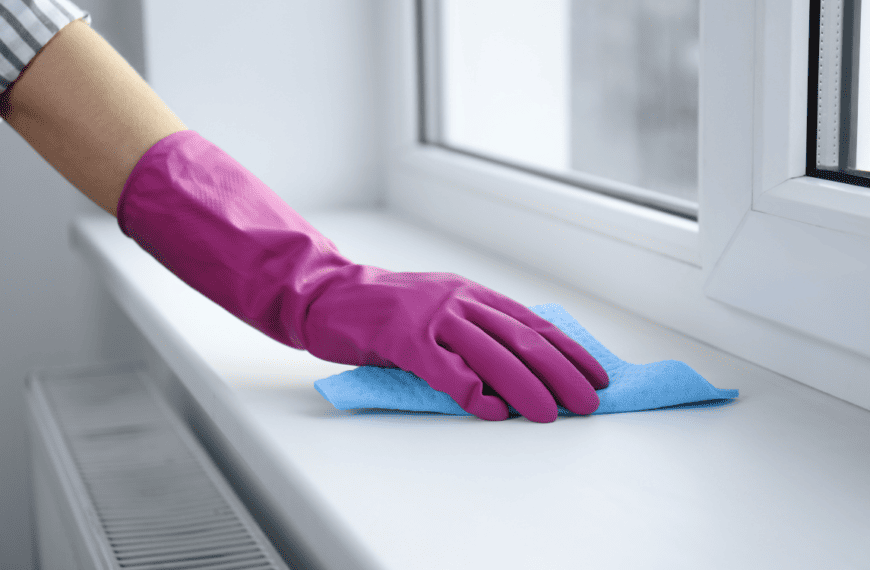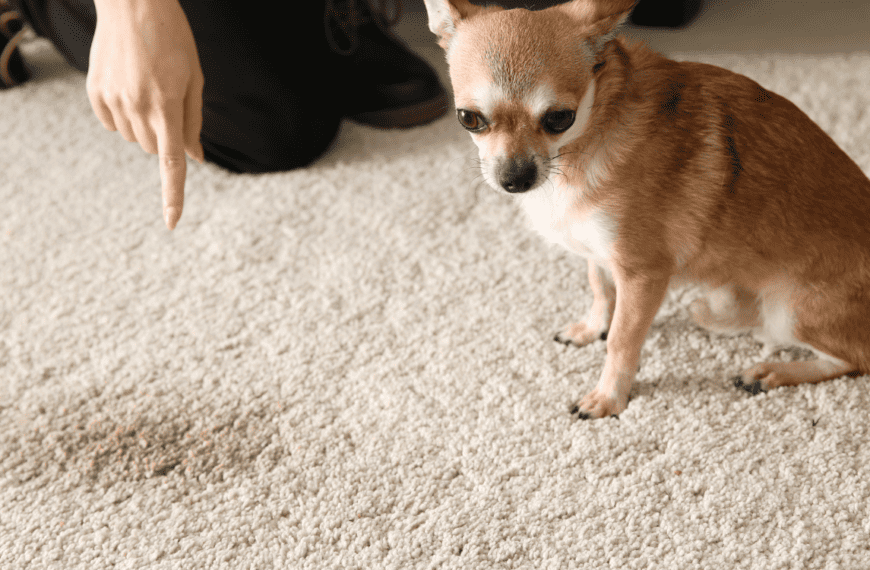White distilled vinegar tends to get all the attention when it comes to cleaning. Apple cider vinegar stands out for its health benefits (like reducing blood sugar and eliminating heartburn), but I’ll tell you it’s just as good for cleaning. If you have some apple cider vinegar in your pantry, let me show you how to create a cleaning solution that you can use anywhere in your home. If you have never used apple cider vinegar for cleaning, I urge you to give it a try!
Before You Begin: Mistakes To Avoid
As much as I love apple cider vinegar, there are some mistakes you can make here. My biggest issue was not diluting the apple cider vinegar enough, and it just became too strong.
- Apple cider vinegar is acidic and has a pH of around 3 or 4; if you don’t dilute the vinegar, it can damage materials like countertops and hardwoods
- Don’t use apple cider vinegar on natural stone surfaces like granite or marble; the stone could be left with etching due to the acidity of the vinegar
- Never mix apple cider vinegar with bleach or chlorine, as it can create a chlorine gas that makes it difficult to breathe
- Rinse the surface completely after using apple cider vinegar; the residue could leave your surfaces sticky and prone to getting dirty or dusty
- Keep your apple cider vinegar cleaning solution away from electronics as it can deteriorate screens and protective coatings
The Ultimate List of How To Use Apple Cider Vinegar for Cleaning
Apple cider vinegar can be used both outdoors and indoors, and as long as you dilute it properly, the risk of damage to most household items is low. If you are ready to incorporate apple cider vinegar into your cleaning routine, here are the best ways:
1. Weed Killing
The acetic acid in apple cider vinegar actually breaks down the cell membranes of the weeds. If you do this on a hot summer day, your weeds will wither and die within a few hours. You need ACV (apple cider vinegar), water, and a spray bottle for this weed-killing solution.
- In a spray bottle, mix equal parts apple cider vinegar and water
- Spray the weeds directly and wait until the sun is in the peak position. Do this when you know rain is not expected
- Ensure you do not spray anything that you don’t want to die; apple cider vinegar is a non-selective herbicide, meaning it has the potential to kill your grass and other plants
2. Trapping Fruit Flies
Fruit flies are attracted to the smell of apple cider vinegar. If you are tired of them flying in circles around your kitchen, this is the best way to trap fruit flies. When the flies stop in to check out the apple cider vinegar smell, the soap essentially sinks them into the solution. You will need a shallow container, apple cider vinegar, plastic wrap, and dish soap.
- Pour apple cider vinegar directly into a plastic dish or container
- Add a few drops of dish soap and then mix the solution
- Place plastic wrap over the dish and then poke small holes in the plastic wrap
- Leave the container out overnight and replace it daily as needed until the flies are gone
3. Cutting Board Refresher
Cutting boards can hold onto bacteria. At times, they need to be sanitized and refreshed, and apple cider vinegar allows you to do this with its natural acidity and sanitizing power. To refresh a cutting board with ACV, you will need a sponge and running water in addition to the vinegar.
- Place your cutting board in your sink
- Wipe down all sides and surfaces of the cutting board with a rag that is covered in apple cider vinegar
- Rinse completely with hot water
- Dry and store
4. Descaling Kettle and Coffee Maker
Apple cider vinegar is known for dissolving and removing mineral deposits like limescale. This natural mineral removal process is even used in the medical world on things like dental equipment. Check the manufacturer’s recommendations for your kettle and coffee maker to ensure this is the right cleaning method. All you will need is water and apple cider vinegar.
- Add equal parts water and apple cider vinegar to the kettle or coffee maker
- Allow the diluted apple cider vinegar to run through the entire cycle
- Dump and then run a clean water cycle
- Make sure that the apple cider vinegar is completely removed before using your kettle or coffee maker; although you can drink apple cider vinegar, it will change the taste of your morning coffee!
5. Mold and Mildew Remover in the Shower
Mold and mildew in the shower occur over time because of the damp conditions that those hot showers create. Apple cider vinegar will break down mold and mildew if it is left to sit for at least 10-20 minutes. You need a scrub brush, clean water, and an apple cider vinegar cleaning solution for this method.
- Create a diluted solution of apple cider vinegar and water by combining equal parts of each
- Place the solution in a spray bottle
- Spray the mold and mildew in the shower and then let it sit for about 15 to 20 minutes
- Now, take a scrub brush and scrub the area where the diluted vinegar has been sitting
- Rinse thoroughly with water and repeat if necessary
6. Showerhead Cleaning and Unclogging
Mineral deposits collect in your shower head, making it difficult for water to flow properly. Apple cider vinegar can break down these minerals and give you your water pressure back. For this, you will need a plastic bag (the larger your shower head, the larger the bag), apple cider vinegar, and a rubber band.
- Place apple cider vinegar in a plastic bag
- Place the showerhead in the plastic bag filled with apple cider vinegar so it is completely submerged
- Use a rubber band to seal the bag and let it sit overnight
- In the morning, run hot water through the shower head for approximately two minutes to clear any leftover debris
7. Cleaning Tile and Grout
Tile and grout can become dirty, but where you really notice a mess is in the shower with soap scum and buildup. Apple cider vinegar will break down the soap scum because of its acidity. For this process, I use apple cider vinegar, water, baking soda, a spray bottle, and a scrub brush.
- Create a cleaning solution that is equal parts water and apple cider vinegar
- Spray the cleaning solution directly on the tile and grout that you are attempting to clean
- Allow the solution to sit for at least five minutes
- Put baking soda on a scrub brush and scrub the area
- Rinse with water and wipe with a wet microfiber cloth when finished
8. Removing Coffee Stains From Mugs
If you have already been using white vinegar to remove stains from coffee cups, you can switch to applying apple cider vinegar and have the same results. Again, the natural acidity in vinegar helps break down the stains and leave your mug looking brand new. You will need apple cider vinegar, baking soda, and an old toothbrush to remove coffee stains from mugs.
- Fill the mug with about a ¼ to ½ inch of baking soda
- Slowly add the vinegar until you have created a paste
- Use a toothbrush to scrub this paste into the areas where the mug is stained
- Let the mug sit for about five minutes and then rinse, check for stains, and repeat
9. Carpet Spot Cleaning
Not only will apple cider vinegar work to spot-clean your carpet, but it can also neutralize pet odors in your home. To spot-clean your carpet, you will need a clean sponge, a small bucket of water, apple cider vinegar, a dry paper towel, and a spray bottle.
- Create a cleaning solution with equal parts apple cider vinegar and water and put it in a spray bottle
- Spray the carpet stain
- Blot the stain with the clean, damp sponge
- Continue this method of blotting and spraying until the stain is removed; do not scrub the stain
- Blog the area with a dry paper towel to absorb any excess water on the carpet
10. Stainless Steel Cleaning
Remove fingerprints from your stainless steel appliances with apple cider vinegar. For this method, all you need is apple cider vinegar, a microfiber cleaning cloth, and paper towels.
- Put a drop of apple cider vinegar on a paper towel
- Use a paper towel to wipe the stainless steel clean
- Before the apple cider vinegar completely dries, use a microfiber towel to buff the stainless steel and leave it with a streak free shine
11. Odor Elimination
Every ugly smell around your home is caused by molecules that need to be neutralized. The acidity in apple cider vinegar will neutralize them for you. Many people also find the smell of apple cider vinegar to be much more pleasing than white vinegar. To use vinegar as an odor eliminator, you need a bottle of apple cider vinegar and a small bowl.
- Fill a small bowl or container with apple cider vinegar
- Place the bowl in an area where there is an issue with odor
- Let the apple cider vinegar sit overnight
- Dump it out in the morning and repeat if necessary
12. Dishwasher
Your dishwasher stinks because of hidden food particles stuck outside your view. Unless you have the right cleaning tips, you may feel like calling in a professional.
Instead, you can fill a small bowl with apple cider vinegar and leave it on the top rack while you do a complete wash cycle (only do this in an empty dishwasher). When finished, wipe down any areas of the dishwasher with a rag that has some apple cider vinegar on it.
13. Washing Machine
To clean a washing machine, you have a few different options. However, apple cider vinegar will be one of your most natural. Place two cups of apple cider vinegar into the bottom of an empty washing machine. Run the full wash cycle, and you should be left with a pleasant smell and a much cleaner machine.
14. Microwave
The microwave gets food particles, grease, and grime that build up over time. Fill a microwave-safe bowl with a cup of water and two tablespoons of apple cider vinegar. Microwave the bowl on high for about five minutes. When finished, allow the microwave to cool and then wipe down the entire inside.
15. Fridge
When cleaning the refrigerator, not only do you need to worry about smells and mildew but also bacteria from spoiled food. Vinegar can use its natural acidity to break down any of these issues you come across, and it’s safer than commercial cleaners.
Simply put apple cider vinegar on a rag soaking in warm water and use it to wipe down all areas of the fridge; pay close attention to the door seals that collect mildew.
16. Stain Removal
I have a lot of different methods for stain removal, but diluted ACV is one that I go to when I run out of lemon juice or one of my gentler, eco-friendly commercial cleaners.
- Fill a spray bottle with equal parts apple cider vinegar and water
- Spray the solution directly onto the stain
- Blot the stain with a paper towel or dry cloth
- Rinse and then put through a normal wash cycle in the washing machine
- Check for remnants of the stain and repeat before placing it in the dryer
17. Unclogging Drains
You can use apple cider vinegar to break down organic material buildup in your drains; it’s a natural alternative to harsh drain cleaners.
- Sprinkle baking soda over the drain; use about a half cup
- Pour a half cup of apple cider vinegar down the drain
- Let the solution sit for about 30 minutes; if you have a cap, you can put it over the drain; it will help the solution be even more effective
- Pour hot water or boiling water down the drain to rinse and remove the cleaning solution
- This can be used as a form of routine maintenance, a way to fix a clogged drain, and even an air freshener for your drains
18. Removing Soap Scum
Apple cider vinegar works on both hard water stains and soap scum, so you can use this as an all-purpose cleaner in the bathroom. The key here is to find an old toothbrush, a small container of apple cider vinegar, and some elbow grease!
- Create a mixture of apple cider vinegar and water
- Dip an old toothbrush into the mixture and use it to scrub the areas where soap scum is present
- If this is not working, you can use full-strength vinegar to see if it starts to dissolve the soap scum
- Rinse with cold water and wipe clean afterwards
19. Mopping Floors
Are you wondering if apple cider vinegar is good for cleaning floors? It’s best not to use apple cider vinegar when cleaning hardwood floors. Over time, you can break down the finish and leave yourself with a deteriorated floor and even a loss of color. However, on a tile floor or even a linoleum floor, apple cider vinegar is effective. You will need a bucket, a mop, and vinegar.
- Take a bucket and fill it with one gallon of water
- Add one cup of apple cider vinegar
- Mop the floors as you normally would, and let this magic potion leave you germ-free and shiny!
20. Window Washing
Window washing with apple cider vinegar is just like cleaning stainless steel. You need paper towels, vinegar, water, and a spray bottle to make this solution work.
- Fill a spray bottle with equal parts vinegar and water
- Spray the window and let the vinegar break down fingerprints, dust and grime
- Wipe clean with a paper towel and buff as needed
21. Toilet Cleaning
Personally, I would rather clean wine glasses or wood floors than have to deal with toilet bowl cleaning, but toilets are unavoidable when it comes to cleaning. The vinegar breaks down things like calcium and lime deposits, so you won’t be left with the ring in your toilet bowl. All you will need is the ACV and a toilet brush.
- Flush your toilet
- Fill the toilet with a cup of undiluted apple cider vinegar
- Use the toilet brush to scrub the entire inside of the toilet
- Let it sit for 15 minutes
- Flush and repeat if necessary
22. All Purpose Cleaning
Finally, we saved the most common use of apple cider vinegar for last. As an all-purpose cleaner, apple cider vinegar uses its acidity to break down dirt, grease, and grime and its natural antibacterial properties to disinfect.
So, what is the mixture of apple cider vinegar for cleaning? Always use at least one part apple cider vinegar and one part water.
There are very few health risks in using apple cider vinegar. However, you should always spot-check the solution on any fabrics or surfaces you plan to use it on.
What Not To Clean With Apple Cider Vinegar?
Apple cider vinegar helps with things like air quality, getting rid of mildew, and even making weed prone areas of your yard look a little better. However, it is a strong acid, and you must be careful of using apple cider vinegar in some areas of the home.
Avoid using apple cider vinegar on natural stones like granite and marble, hardwood floors, and electric screens. When using apple cider vinegar to clean surfaces, make sure the surface does not have a varnish or finish that could be stripped.
What Makes ACV Good for Cleaning?
I’ve mentioned several times that ACV is better for cleaning than commercial solutions. If you are like me and you like using natural solutions, apple cider vinegar is a great choice. Here’s why:
- Natural and non-toxic cleaning solution
- Antimicrobial properties help to deodorize and disinfect
- Cost-effective and good for the environment at the same time
- It can be used for a variety of household cleaning projects
- Breaks down mineral deposits, grease, and grime
- Safe for most surfaces and fabrics, and even safe to eat and consume
- The smell is not as strong as white distilled vinegar
Does White Vinegar or Apple Cider Vinegar Clean Better?
White vinegar tends to be a bit stronger from an acidity standpoint (depending on the brand) than apple cider vinegar by about 1 to 2 percent. Therefore, white vinegar can be known to clean a little better. However, you may ask, can I use apple cider vinegar instead of white vinegar for cleaning? Yes, you can replace apple cider vinegar with white vinegar in most situations and find it to be just as effective.
Frequently Asked Questions (FAQ)
How Can I Mask the Strong Scent of Apple Cider Vinegar?
If the smell of apple cider vinegar bothers you, simply add a few drops of essential oils to mask the smell. Peppermint and lavender do a good job of hiding the stronger smell.
Can Apple Cider Vinegar Harm My Pets?
Apple cider vinegar can be harmful to pets if ingested in large quantities, as its acidity can disrupt their digestive system, leading to vomiting and diarrhea. Keep it out of their reach to ensure their safety.
Does Apple Cider Vinegar Leave a Residue or Smell After Cleaning?
Apple cider vinegar may leave a temporary smell but no residue after cleaning. Wiping the area dry can help eliminate the odor.
How Do I Store My Apple Cider Vinegar Cleaning Solution?
Store your apple cider vinegar cleaning solution in a cool, dark cabinet to maintain its potency and prevent degradation. This minimizes exposure to heat and light, which can break down the vinegar’s active components, reducing its cleaning efficacy.

